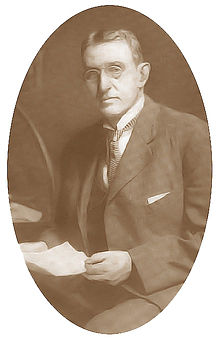Author:George Howard Earle (1856-1928)
Appearance
Works
[edit]| “ | Those on the Lever Act, as amended, led me to read an excellent, if somewhat verbose, discussion by George H. Earle, Jr... —Oliver Wendell Holmes, Jr. on reading Does Price Fixing Destroy Liberty? (1920)[4] |
” |
- The Liberty to Trade as Buttressed by National Law 84pp. (1909)
- Plan of Bill Proposed by Hon. George H. Earle, Jr., Philadelphia. (1911)
- Catalogue of the magnificent collection of ancient Greek and Roman, European, Oriental, early American and United States coins of George H. Earle, Jr., Esq., Philadelphia 225pp. (1912) (external scan)
- Does Price Fixing Destroy Liberty? A consideration of certain economic and common law principles applying to governmental interferences with the liberty of trade. 183pp. (1920)
- Is Capital Income?: Does the power of taxation to destroy extend to the destruction of constitutional guarantees? 42pp. (1921)
Articles
[edit]Letters
[edit]- Letter to Samuel W. Pennypacker from George H. Earle, Jr., February 29, 1904
- Letter to Samuel W. Pennypacker from George H. Earle, Jr., April 18, 1904
- Letter to Samuel W. Pennypacker from George H. Earle, Jr., May 16, 1906
Court testimony
[edit]- Testimony of George H. Earle, Jr. (7 Feb 1891) Seventh meeting of the Joint Legislative Committee to investigate the cause of the failures of state and private banks.[5]
- "Testimony of Mr. George H. Earle, Jr."[6] (28-29 June 1911) Hearings Held Before the Special Committee on the Investigation of the American Sugar Refining Co. and Others. Vol. 2, p. 1217-1272. House of Representatives: Washington Government Printing Office (1911)
- "Statement of George H. Earle, Jr., Real Estate Trust Co., Broad and Chestnut Streets, Philadelphia, PA." (6 December 1911)[7] Hearing Before the Committee on Interstate Commerce, United States Senate, Sixty-Second Congress, Pursuant to S. Res. 98: A resolution directing the Committee on Interstate Commerce to investigate and report desirable changes in the laws regulating and controlling corporations, persons, and firms engaged in interstate commerce. (1912) Vol. I, p. 770-810.
Works about Earle
[edit]- "George H. Earle, Jr., Surgeon-General of Finance" by Richard Jarvis (Hampton's Magazine V. 22, No. 4, April 1909)
- George H. Earle, Jr., Doctor to Ailing Corporations by John Kimberly Mumford. (Munsey's Magazine, February 1910)
- The Wizardry of George H. Earle, Jr. (Current Literature, November 1911)
- "Shows Monopoly to Have Been a Menace for Centuries: George H. Earle, Jr., Noted Philadelphia Business Man, Tells Senate Committee on Interstate Commerce Sherman Law Should be Strengthened—Cites History to Prove Continual Fight Against, and Evils of, Monopoly—How to Amend the Law."[8] (Telephony, 3 February 1912)
Notable ancestors and descendants
[edit]- Pliny Earle I, inventor (Great-grandfather)
- Thomas Earle, abolitionist, lawyer, philanthropist (Grandfather)
- Samuel Van Leer, well known Pennsylvania Irons works owner and a United States Army officer (Grandfather)
- George Hussey Earle, Sr., Philadelphia lawyer (Father)
- Florence Earle Coates, poet (Sister)
- George Howard Earle III, former Pennsylvania Governor (Son)
- Ralph Earle II, U. S. Ambassador (Grandson)
External links
[edit]- New York Times archive search results for George H. Earle, Jr. (spanning years 1892 through 1920)
- The Fall of Bossism: A History of the Committee of One Hundred, and the Reform Movement in Philadelphia and Pennsylvania. (1883) George H. Earle, Jr. and his father, George H. Earle, Sr. were both members of the Committee of One Hundred—"a non-partisan effort in aid of good government."[9]
- Tracts of land in Aspen Hill, MD formerly purchased and owned in 1905 and 1906 by George H. Earle, Jr. (Bradford's Rest & Hermitage)
References
[edit]- ↑ Read about the history of the Committee of One Hundred on Google Books.
- ↑ "The Guarantee Trust and Safe Deposit Company got sick and sent for him. So did the Finance Company of Philadelphia. So did the Tradesmen's Bank. So did the Market Street National...and to-day they are all flourishing... He was consulting physician when the Reading Railroad was sick. Then he figured in two sensational cases that gave him a national reputation. One was the smash of the Chestnut Street National Bank and the Chestnut Street Trust Company... The other sensational case was the Real Estate Trust Company..." (from "The Wizardry of George H. Earle, Jr." Current Literature, November 1911)
- ↑ "A Central Bank as a Menace to Liberty," by George H. Earle, Jr. The Annals of the American Academy of Political and Social Science. Vol. XXXI No. 2: Lessons of the Financial Crisis, March 1908.
- ↑ from a letter Mr. Holmes wrote to w:Felix Frankfurter on 24 October 1920. [Mennel, Robert M. and Christine L. Compston, ed. Holmes and Frankfurter: their correspondence, 1912-1934 (1996), p. 95.]
- ↑ From Proceedings of Joint Committee of the Legislature of Pennsylvania, Appointed to Investigate the Cause of the Recent Failures of All Incorporated State and Private Banks. Harrisburg: Edwin K. Meyers, State Printer. 1891; pp. 84-86.
- ↑ Read Mr. Earle's testimony on Google Books.
- ↑ Read Mr. Earle's testimony on Google Books.
- ↑ Read this article at Google Books.
- ↑ The Progressive Men of the Commonwealth of Pennsylvania. Vol II. Logansport, Ind. A. W. Bowen & Co. 1900: p. 847.
![]()
Some or all works by this author are in the public domain in the United States because they were published before January 1, 1930.
This author died in 1928, so works by this author are in the public domain in countries and areas where the copyright term is the author's life plus 96 years or less. These works may be in the public domain in countries and areas with longer native copyright terms that apply the rule of the shorter term to foreign works.
![]()
Public domainPublic domainfalsefalse


